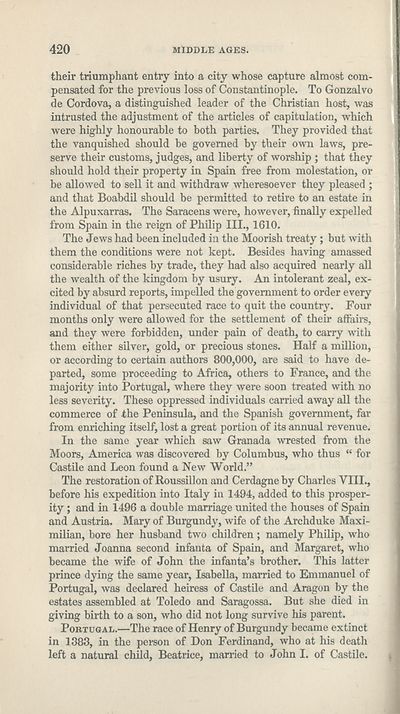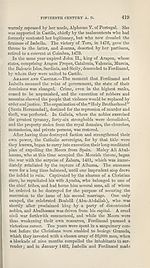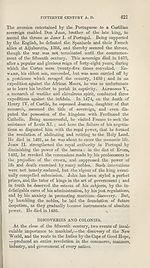Download files
Complete book:
Individual page:
Thumbnail gallery: Grid view | List view

420
MIDDLE AGES.
their triumphant entry into a city whose capture almost com¬
pensated for the previous loss of Constantinople. To Gonzalvo
de Cordova, a distinguished leader of the Christian host, was
intrusted the adjustment of the articles of capitulation, which
were highly honourable to both parties. They provided that
the vanquished should be governed by their own laws, pre¬
serve their customs, judges, and liberty of worship ; that they
should hold their property in Spain free from molestation, or
be allowed to sell it and withdraw wheresoever they pleased ;
and that Boabdil should be permitted to retire to an estate in
the Alpuxarras. The Saracens were, however, finally expelled
from Spain in the reign of Philip III., 1610.
The Jews had been included in the Moorish treaty ; but with
them the conditions were not kept. Besides having amassed
considerable riches by trade, they had also acquired nearly all
the wealth of the kingdom by usury. An intolerant zeal, ex¬
cited by absurd reports, impelled the government to order every
individual of that persecuted race to quit the country. Four
months only were allowed for the settlement of their affairs,
and they were forbidden, under pain of death, to carry with
them either silver, gold, or precious stones. Half a million,
or according to certain authors 800,000, are said to have de¬
parted, some proceeding to Africa, others to France, and the
majority into Portugal, where they were soon treated with no
less severity. These oppressed individuals carried away all the
commerce of the Peninsula, and the Spanish government, far
from enriching itself, lost a great portion of its annual revenue.
In the same year which saw Granada wrested from the
Moors, America was discovered by Columbus, who thus “ for
Castile and Leon found a New World.”
The restoration of Roussillon and Cerdagne by Charles VIII.,
before his expedition into Italy in 1494, added to this prosper¬
ity ; and in 1496 a double marriage united the houses of Spain
and Austria. Mary of Burgundy, wife of the Archduke Maxi¬
milian, bore her husband two children; namely Philip, who
married Joanna second infanta of Spain, and Margaret, who
became the wife of John the infante’s brother. This latter
prince dying the same year, Isabella, married to Emmanuel of
Portugal, was declared heiress of Castile and Aragon by the
estates assembled at Toledo and Saragossa. But she died in
giving birth to a son, who did not long survive his parent.
Portugal.—The race of Henry of Burgundy became extinct
in 1383, in the person of Don Ferdinand, who at his death
left a natural child, Beatrice, married to John I. of Castile.
MIDDLE AGES.
their triumphant entry into a city whose capture almost com¬
pensated for the previous loss of Constantinople. To Gonzalvo
de Cordova, a distinguished leader of the Christian host, was
intrusted the adjustment of the articles of capitulation, which
were highly honourable to both parties. They provided that
the vanquished should be governed by their own laws, pre¬
serve their customs, judges, and liberty of worship ; that they
should hold their property in Spain free from molestation, or
be allowed to sell it and withdraw wheresoever they pleased ;
and that Boabdil should be permitted to retire to an estate in
the Alpuxarras. The Saracens were, however, finally expelled
from Spain in the reign of Philip III., 1610.
The Jews had been included in the Moorish treaty ; but with
them the conditions were not kept. Besides having amassed
considerable riches by trade, they had also acquired nearly all
the wealth of the kingdom by usury. An intolerant zeal, ex¬
cited by absurd reports, impelled the government to order every
individual of that persecuted race to quit the country. Four
months only were allowed for the settlement of their affairs,
and they were forbidden, under pain of death, to carry with
them either silver, gold, or precious stones. Half a million,
or according to certain authors 800,000, are said to have de¬
parted, some proceeding to Africa, others to France, and the
majority into Portugal, where they were soon treated with no
less severity. These oppressed individuals carried away all the
commerce of the Peninsula, and the Spanish government, far
from enriching itself, lost a great portion of its annual revenue.
In the same year which saw Granada wrested from the
Moors, America was discovered by Columbus, who thus “ for
Castile and Leon found a New World.”
The restoration of Roussillon and Cerdagne by Charles VIII.,
before his expedition into Italy in 1494, added to this prosper¬
ity ; and in 1496 a double marriage united the houses of Spain
and Austria. Mary of Burgundy, wife of the Archduke Maxi¬
milian, bore her husband two children; namely Philip, who
married Joanna second infanta of Spain, and Margaret, who
became the wife of John the infante’s brother. This latter
prince dying the same year, Isabella, married to Emmanuel of
Portugal, was declared heiress of Castile and Aragon by the
estates assembled at Toledo and Saragossa. But she died in
giving birth to a son, who did not long survive his parent.
Portugal.—The race of Henry of Burgundy became extinct
in 1383, in the person of Don Ferdinand, who at his death
left a natural child, Beatrice, married to John I. of Castile.
Set display mode to:
![]() Universal Viewer |
Universal Viewer | ![]() Mirador |
Large image | Transcription
Mirador |
Large image | Transcription
| Antiquarian books of Scotland > Education > Elements of universal history on a new and systematic plan > (440) |
|---|
| Permanent URL | https://digital.nls.uk/127585420 |
|---|
| Description | Thousands of printed books from the Antiquarian Books of Scotland collection which dates from 1641 to the 1980s. The collection consists of 14,800 books which were published in Scotland or have a Scottish connection, e.g. through the author, printer or owner. Subjects covered include sport, education, diseases, adventure, occupations, Jacobites, politics and religion. Among the 29 languages represented are English, Gaelic, Italian, French, Russian and Swedish. |
|---|

